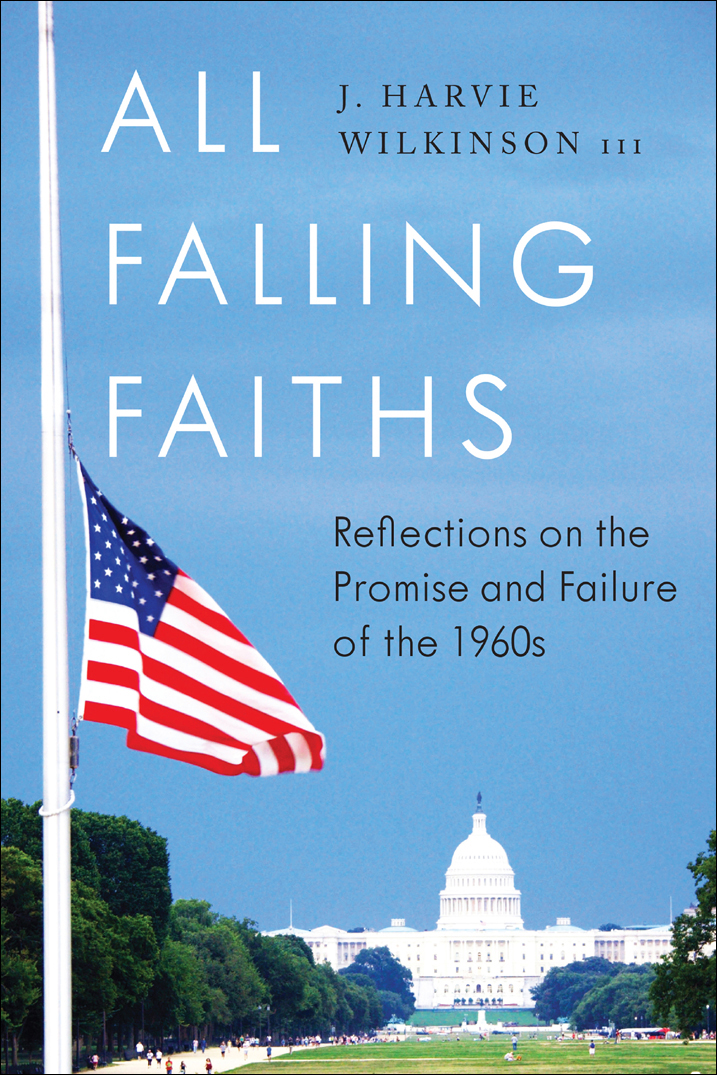

 2017 by J. Harvie Wilkinson III
2017 by J. Harvie Wilkinson III
All rights reserved. No part of this publication may be reproduced, stored in a retrieval system, or transmitted, in any form or by any means, electronic, mechanical, photocopying, recording, or otherwise, without the prior written permission of Encounter Books, 900 Broadway, Suite 601, New York, New York 10003.
First American edition published in 2017 by Encounter Books,
an activity of Encounter for Culture and Education, Inc.,
a nonprofit, tax-exempt corporation.
Encounter Books website address: www.encounterbooks.com
Manufactured in the United States and printed on acid-free paper. The paper used in this publication meets the minimum requirements of ANSI/NISO Z39.481992 (R 1997) (Permanence of Paper).
FIRST AMERICAN EDITION
LIBRARY OF CONGRESS CATALOGING-IN-PUBLICATION DATA
Names: Wilkinson, J. Harvie, III, 1944 author.
Title: All falling faiths: reflections on the promise and failure of the 1960s / by J. Harvie Wilkinson III.
Description: New York: Encounter Books, 2017. | Includes bibliographical references and index.
Identifiers: LCCN 2016011695 (print) | LCCN 2016012167 (ebook) | ISBN 9781594038921 (Ebook)
Subjects: LCSH: Wilkinson, J. Harvie, III, 1944 | JudgesUnited StatesBiography. | United StatesSocial conditions19601980. | LawPolitical aspectsUnited StatesHistory20th century. | Nineteen sixties.
Classification: LCC KF373.W4654 A3 2017 (print) | LCC KF373.W4654 (ebook) | DDC 347.73/2434dc23
LC record available at http://lccn.loc.gov/2016011695
PRODUCED BY WILSTED & TAYLOR PUBLISHING SERVICES
To
My Beautiful Wife
and
My Beloved Country
Table of Contents
Guide
Contents
They call us baby boomers. We have been misnamed. We are the Sixties Generation, who now with unaccustomed humility must beseech future generations to build back the nation we did much to tear down.
They have every right to tell us no. The world is very much a mess. Instantaneous information, immediate connectivity, often good and necessary in themselves, cloud our ability to make sense of it all. Ferguson, Baltimore; ISIS, 9/11; Dallas and Orlando; Ebola fears and rising seas cascade upon us. Our present worries foretell danger from which every human instinct is to hide; we await many an unpleasant surprise. There may be a rush to private havens, a willingness to abandon America to inevitability, a tendency to see hope and opportunity as bygone relics of a nave age.
Two thousand sixteen became the new centurys Year of Anger. Anger at whoever is different. Anger at whatever has changed. Anger, write the Washington Posts David Maraniss and Robert Samuels, at Wall Street. Anger at Muslims. Anger at trade deals. Anger at Washington. Anger at police shootings of young black men. Anger at President Obama. Anger at Republican obstructionists.... Specific anger and undefined anger and even anger about anger.
It has been building for a long time. New York Times columnist Frank Bruni notes that for a solid decade the percentage of Americans who said that the United States was on the wrong track had exceeded the percentage who said it was on the right track, often by astounding and increasing numbers. He wondered about a change in the very psychology and identity of a country once famous for its sunniness about tomorrows.
The mindset of eternal negativity is something the 1960s helped to load upon us. It is not a burden we should ever accept. The values the Sixties scorned; the chaos they engendered; the divisions they spawnedthese are not our fates! Great enduring constants exist in this world that may yet guide us. From that burnt and ravaged forest of a decade may still spring the shoots of America anew.
But to overcome the Sixties, we must first understand them. One must sometimes first go back in time in order to move forward.
As a federal judge for more than thirty years and counting, I feel some days Ive earned the right to reminisce. Maybe all my generation has.
But reminiscence is a mellow flight over a time, even a lifetime, amiably spent. No one should ever reminisce about the 1960s. Those years are memorys scorched earth.
I too am almost afraid to go back. That decade spared me none of itself: its lack of humor, its self-absorption, its fear of age, its resentment of authority, its rush to confrontation, its grim, bleating fret with the Establishment.
So why not leave those years behind? Because it was therein the Sixtiesthat feelings toward home, work, school, church, and flag forever changed. The 1960s did not end in 1970. They haunt us even now. Many Americans sense the world unraveling around them and wonder why. They want to know why they feel anxious about all that awaits their children and grandchildren. There are many reasons why, but one of the big reasons is the 1960s.
It is too easy to blame all that happened in the 1960s on student radicals. Certainly the mindless nihilism of the radicals was destructive, but the radicals alone could not have maimed our country. Those who were supposed to lead and guide our nationthe generation that so inspired America in the Depression and World War IIalso abdicated their duty and let us down in the 1960s.
Together, those who challenged authority and those who exercised authority made the Sixties an experience in lethal blindness. No one could see. The angry left saw no good in America. The Establishment saw almost nothing bad. No one foresaw the lasting damage the Sixties would inflict. No one sensed the Sixties would shake our foundations even today.
I know many Americans believe the 1960s was one of the greatest decades ever. They believe that the decade made our country more equal and more just: that African Americans and eventually all minorities benefited more from the 1960s than from any time since the Civil War; that women became freer to make choices about home, children, husband, and career than ever before; that Americans learned from the debacle of Vietnam that the greatest power in the world could overreach. Many good people think the 1960s accomplished many good things, and I wholeheartedly agree with them.
Few decades did so much good for America as the 1960s. But no decade inflicted so much continuing harm. The Sixties gave us some wonderful things, but this very gift has caused us to downplay the decades darker side. Righting terrible social wrongs should never have come at such a horrible cost: so much lasting loss of faith in this great land.
In the 1960s, we lost much of the true meaning of education, much of our capacity for lasting personal commitments, much of our appreciation for the rule of law, and much of our sense of rootedness and home. We started to lose also the sense of those things that are larger than ourselves: the desire for service, the feeling for country, the need for God.
Many of those arguing about the 1960s today never lived through them. To live in the Sixties was exhilarating at best, but disturbing and harrowing most of the time. You enjoy a ride on the roller coaster at the fair because you know the ride will end. With the Sixties, we never knew. And the ride goes on.











 2017 by J. Harvie Wilkinson III
2017 by J. Harvie Wilkinson III